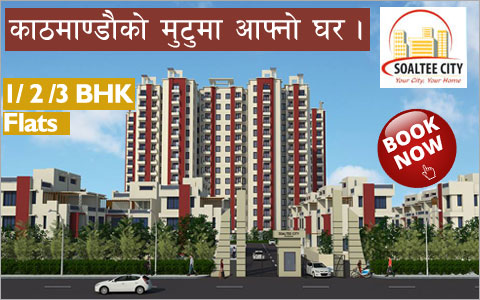National News

Demand for rental houses is at an all time high in cities like Kathmandu, Pokhara, Bharatpur, Biratnagar, and Lalitpur, said a report recently published by the Ministry of Urban Development.
According to the report “Inclusive Cities: Resilient Communities”, private sector has been catering to the housing needs especially in Kathmandu Valley to some extent through group housing and apartments under the Apartment Ownership Act, 1997.
However, there is a need for reviewing the existing legal provisions, regulations and standards for group housing and apartment, especially, with regard to the provision of safe and affordable housing.
“Private sector housing has mostly been targeted for high income groups. The challenge lies in catering to the housing needs of the low income groups and introducing cooperative housing, and housing provision through public-private partnership,” it read.
More than 500,000 houses are required for full scale recovery from devastating earthquake of 2015 to avoid homelessness. Similarly, about 3,000 office buildings need to be rebuilt which requires a huge investment. In the absence of proper reconstruction policies and implementation guidelines, the reconstruction under the Sendai Framework with the principle of resiliency faces a lot of challenges, it said.
The report also reveals that urban areas of Nepal have low densities, creating difficulty in providing urban services as investment costs for the services are high. The challenge lies in providing better services and improving efficiency.
“Providing water in sufficient quantity and quality on a reliable basis is a major challenge in all urban areas. To ensure adequate safe drinking water, rainwater harvesting could be a sustainable means. Recharging the ground water through rainwater harvesting will be helpful for maintaining the ground water level,” the report said.
Achieving cost recovery in urban water supply and sanitation system is another challenge at present. The treatment systems are either of insufficient capacity or are in need of maintenance and repair. The introduction of decentralised waste water system can supplement the centralised systems especially in the peri-urban and rural areas. Proper solid waste management and waste water treatment can lead to cleaner river water especially in urban areas, it suggested.
source: the himalayan times, 10 june 2017
- 9th Nepal Buildcon International Expo 2024
- Real Estate Expo 2023
- NRB raises housing loan limit to encourage home constructions
- Nepal Rastra Bank (NRB) Monetary Policy 2080-2081
- New Price of Land in Kathmandu Metropolitan City, Nepal
- Capital Gains Tax Rate on Real Estate Transactions in Nepal 2080-81 ( 2023/24 )
- Kathmandu metropolis implements free parking policy for commercial buildings and hospitals

![[X]](https://www.housingnepal.com/images/popup-close-button.png)






























































































































































































































































































































































































 Facebook
Facebook
 Delicious
Delicious
 Digg
Digg
 Reddit
Reddit
 Stumble Upon
Stumble Upon









